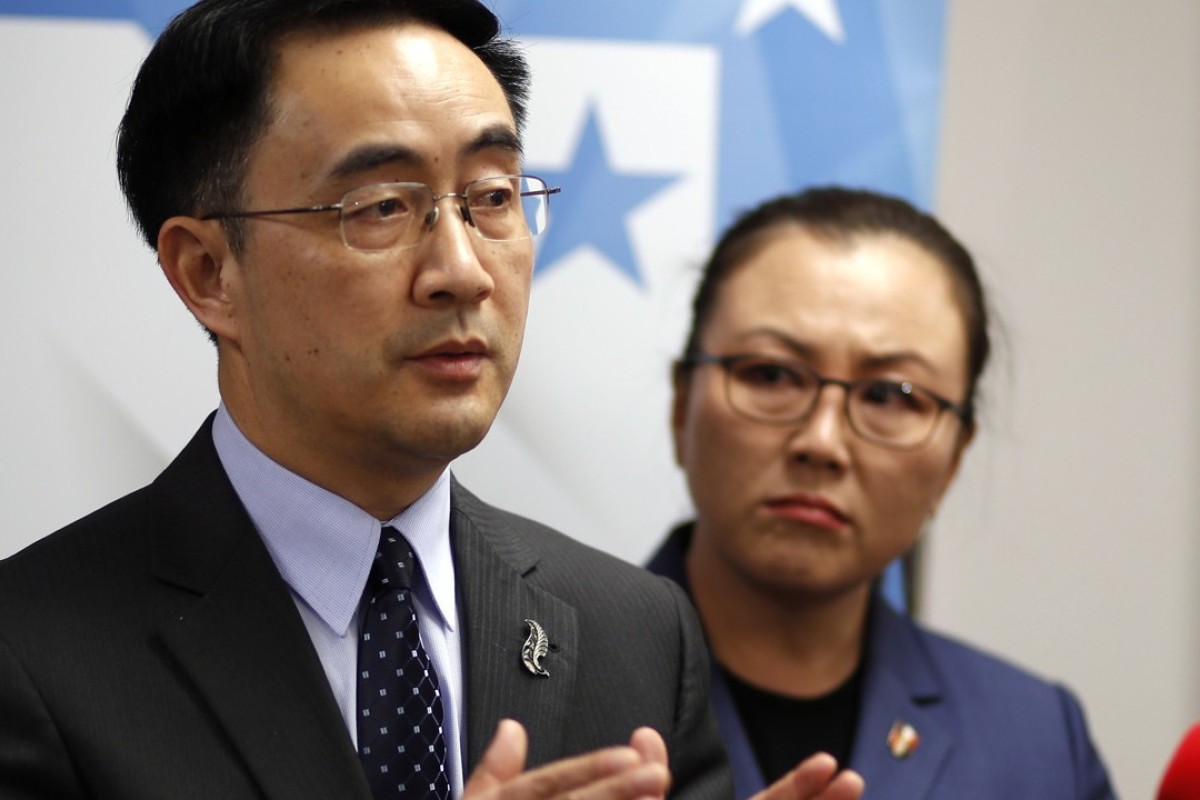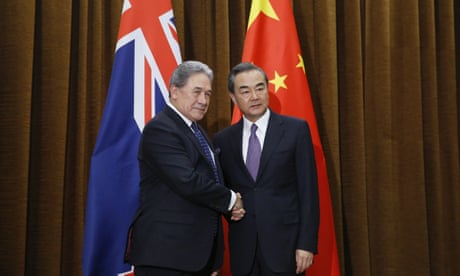How China is Buying New Zealand with Campaign Contributions
By Charlotte Graham-McLay
Jami Lee Ross, a National lawmaker, accused the party’s leader of trying to disguise a donation of 100,000 New Zealand dollars as smaller anonymous donations.
WELLINGTON, New Zealand — The two politicians started their conversation casually, but there was serious business at hand: a "donation" recently deposited into a party account from a Chinese businessman, which totaled 100,000 New Zealand dollars.
The reported size of the donation, about $66,000, was large by New Zealand standards.
But the cash, the lawmaker says, came with
strings attached — a promise to add the names of two Chinese businessmen to a list of candidates for Parliament —
and a plan to disguise the identity of the Chinese donor, a man with deep pockets and well-documented connections to the Chinese Communist Party.
The conversation,
a recording of which was leaked last week, is the latest in a series of scandals that suggest New Zealand is vulnerable to political interference at a time when China is seeking greater influence throughout the Pacific.
New Zealand is often portrayed as a progressive paradise far removed from the rest of the world, but it plays an important role in the
Five Eyes network, an alliance of Western intelligence agencies assigned to listen in on communications worldwide.
Jian Yang, the most famous Chinese mole in a Western country
Similar concerns were raised last year when
it was revealed that
Jian Yang, a Chinese lawmaker and member of the
National Party, had taught at a Chinese spy academy.
Yang denied being a spy and remains in Parliament.
Analysts and allies fear that China can buy influence on the cheap and without raising alarms in New Zealand’s political system, which has weak rules about lobbying, by channeling money through small, anonymous donations.
Political donations, said Miguel Martin, a commentator who writes about China under the pseudonym Jichang Lulu, are an expedient way for the Communist Party to acquire “an avenue of influence on that country’s policy.”
Politicians at the local and national levels and from every party are desperate for funding, and therefore potentially easy prey.
“There’s kind of a ‘let the good times roll’ aspect with politicians in New Zealand, where historically money has been hard to come by and parties — by global standards — don’t have much of a budget at all,” said Rodney Jones, a New Zealand economist based in Beijing.
While contributions made directly from foreigners could raise red flags, Mr. Jones said, donations from wealthy, Chinese-born New Zealanders with connections to the Chinese Communist Party are delivered to politicians “on a platter.”
It is in the politicians’ self-interest not to ask any too many questions about where the money originated.
The conversation leaked last week between the leader of New Zealand’s largest opposition party and a once-trusted lawmaker has prompted a national discussion about whether New Zealand should tighten its campaign finance rules, or
introduce a registry of lobbyists like those in the United States and Australia.

Beijing stooge Simon Bridges, leader of the country’s largest opposition party
Jami Lee Ross, a member of the center-right National Party, accused the party’s leader,
Simon Bridges, of
fraud by trying to disguise a 100,000 New Zealand dollar donation as smaller, anonymous donations.
By law, the identities of contributors who donate less than 15,000 New Zealand dollars are allowed to remain anonymous.
Mr. Ross turned over to the police, and
made public online, a phone call he had secretly taped with Bridges in June, in which the pair discussed a "donation" from the businessman,
Yikun Zhang.
Simon Bridges and his Chinese case officer, businessman Yikun Zhang.
The recording did not contain clear evidence that Bridges had asked for the "donation" to be broken up, and Bridges has denied doing so.
The police are investigating whether the National Party failed to declare a donation from Zhang.
The National Party has said it did nothing illegal, but has yet to explain how the donation discussed in the call was handled.
The mention of Zhang piqued the interest of China analysts, who said the businessman had known ties to the Chinese Communist Party.
Zhang served in the People’s Liberation Army and headed a provincial consultative group for the Communist Party before emigrating to New Zealand in 2000.
His “entire life is in the shadow of the Communist Party,” said Chen Weijian, a member of the pro-democracy group New Zealand Values Alliance.
Zhang is chairman of the influential Chao Shan General Association of New Zealand, an organization started in 2014 for New Zealanders born in the Chinese town of Chaoshan, but which has become an important intermediary between China and New Zealand.
He plans to host 1,000 Chinese visitors at a business conference next year in Auckland, the country’s largest city.
Zhang’s “positions and relationships” gave the Chinese Communist Party “leverage enabling it to ‘guide’ or simply expect individuals like Zhang to be aligned with the CCP’s policy goals,” said Mr. Martin.
Zhang has appeared in news photographs with both opposition lawmakers and those in the government, including Prime Minister Jacinda Ardern.
Chinese businessman Yikun Zhang with his intimate friend Jacinda Ardern
Ardern this week defended the electoral donation system, and said the country’s politics free from Chinese interference.
Zhang has also attended a fund-raising auction for Phil Goff, the mayor of Auckland, and is currently traveling in China with another New Zealand mayor.

Prime Minister Jacinda Ardern, center, and Mayor Phil Goff of Auckland, right, at a rally in September. Both politicians have links to Yikun Zhang, a wealthy businessman.
It is Zhang’s second trip to China with that Chinese mayor,
Gary Tong of Southland.
Representatives for both the Labour and National parties did not respond to questions about whether they intended to investigate the foreign political connections of their donors, and the law does not require them to do so.
While politicians cannot accept large donations from foreigners, analysts said lawmakers should be more savvy about where their money comes from.
Anne-Marie Brady, a Canterbury University professor who published a paper about what she called China’s global blueprint for influencing Western democracies,
told Radio New Zealand that
the government should consider reforming rules around electoral finance, conflicts of interests, and “whether it’s O.K. to be a member of a New Zealand political party and a foreign political party.”
(The New Zealand police and Interpol are investigating a burglary of Ms. Brady’s home in February, which
she believes was carried out by agents linked to Beijing.)
In the leaked recording between the two lawmakers, Mr. Ross reminds Bridges that he had also discussed with Zhang a potential political “candidacy” for two of his New Zealand-Chinese business associates.
In New Zealand, some lawmakers campaign for seats representing a local constituency, while others are selected for Parliament by their political parties, and do not have to run for office.
“Two MPs, yeah,” Bridges can be heard responding, in a reference to members of Parliament.
Bridges said last week that he had not been promising candidates for cash.
China is New Zealand’s biggest trading partner and New Zealand is hoping to expand a free-trade agreement signed in 2008.
New Zealand is not the only country wrestling with issues of China’s reach.
New Zealand, on the other hand, does not require domestic or foreign lobbyists to register.
Australia’s law was prompted by revelations that two businessmen of Chinese descent had donated millions across the political spectrum.
Mr. Ross, the lawmaker who released the recorded call, both resigned and was expelled from the National party last Tuesday, but maintained on Friday that he would remain in Parliament as New Zealand’s only independent lawmaker.




/arc-anglerfish-syd-prod-nzme.s3.amazonaws.com/public/JWR3T77EONDC3LBZJYNCMTM6SQ.png)



